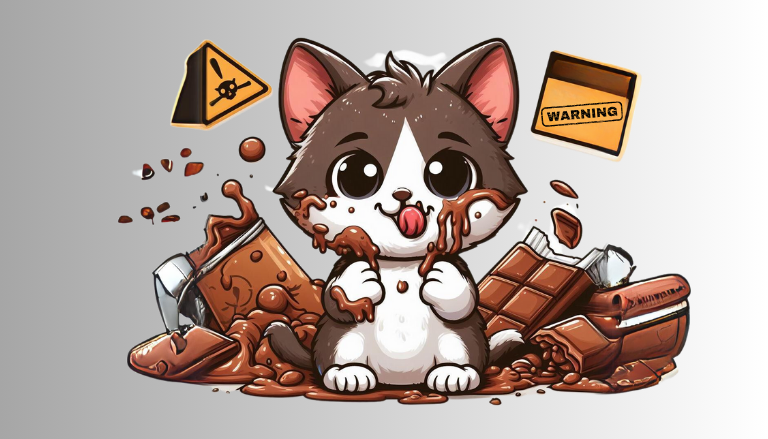Are you wondering if cats can eat chocolate? It’s important to know that chocolate is toxic to our feline friends. While we may enjoy indulging in a chocolate treat, it can pose serious health risks to cats. Understanding the dangers of chocolate for cats is crucial to keeping them safe and healthy.
Chocolate contains two compounds, theobromine and caffeine, which animals cannot naturally metabolise. These substances can lead to toxic buildup in cats, potentially causing severe reactions and even liver failure. Darker chocolates and baking chocolates are particularly dangerous due to their higher theobromine and caffeine concentration.
If your cat consumes chocolate, it’s vital to act quickly. Contacting a vet immediately is essential to ensure prompt treatment. Symptoms of chocolate poisoning in cats include vomiting, diarrhea, increased thirst, increased heart rate, muscle tremors, seizures, and even coma. Don’t hesitate to seek professional help if you suspect your furry friend has ingested chocolate.
Prevention is key when it comes to chocolate poisoning. Cats should never be given chocolate as a treat. Instead, opt for cat-friendly treats that offer a range of health benefits and nutritional support. Providing your cat with a balanced and appropriate diet is essential for their overall wellbeing.
Principais conclusões:
- Chocolate is toxic to cats due to theobromine and caffeine content.
- Darker chocolates and baking chocolates are the most dangerous for cats.
- Symptoms of chocolate poisoning in cats include vomiting, diarrhea, increased thirst, and seizures.
- If your cat ingests chocolate, contact a vet immediately for treatment.
- Prevent chocolate poisoning by offering cat-friendly treats that support their health and nutrition.
Why is Chocolate Toxic to Cats?
Chocolate is a delightful treat for humans, but for cats, it can be extremely harmful and even fatal. The reason behind this lies in two key components found in chocolate: theobromine and caffeine. These substances are naturally present in cocoa beans, from which chocolate is derived, and they can have a toxic effect on cats’ bodies. Unlike humans, cats lack the necessary enzymes to effectively metabolize theobromine and caffeine, leading to a buildup of these compounds in their system.
The concentration of theobromine and caffeine varies across different types of chocolate, with dark chocolates and baking chocolates containing higher amounts compared to milk or white chocolates. This makes them particularly dangerous for cats. Even small amounts of these chocolates can lead to severe reactions and pose a significant risk to feline health. Additionally, some chocolate candies may contain xylitol, a sweetener that is toxic to cats, further increasing the dangers associated with chocolate consumption.
“Chocolate is toxic to cats because it contains theobromine and caffeine, which animals cannot naturally metabolize.”
When a cat ingests chocolate, theobromine and caffeine can cause a range of symptoms that indicate chocolate poisoning. These symptoms may include vomiting, diarrhea, increased thirst, a rapid heart rate, muscle tremors, and even seizures. The severity of the symptoms depends on factors such as the amount and type of chocolate consumed, as well as the individual cat’s sensitivity. It is crucial to recognize these signs and seek veterinary assistance immediately if you suspect your cat has ingested chocolate.
| Type of Chocolate | Theobromine Content | Caffeine Content |
|---|---|---|
| Milk Chocolate | 44-64 mg/ounce | 6 mg/ounce |
| Semisweet Chocolate | 150-260 mg/ounce | 22 mg/ounce |
| Baking Chocolate | 450 mg/ounce | 35 mg/ounce |
To protect your feline companion from the dangers of chocolate, it is essential to keep all chocolate products out of their reach. Ensure that family members and visitors are aware of this toxic risk and do not offer chocolate to your cat as a treat. Instead, opt for cat-friendly treats that are specifically formulated to meet their nutritional needs and are safe for consumption. By making informed choices and prioritizing your cat’s well-being, you can keep them happy and healthy.
Symptoms and Risks of Chocolate Poisoning in Cats
Chocolate poisoning in cats can have serious consequences, and it’s essential to be aware of the symptoms and risks associated with it. When cats consume chocolate, they can experience a range of symptoms that may indicate poisoning, including vomiting, diarrhea, decreased appetite, increased thirst, increased heart rate, restlessness, muscle tremors, seizures, and even coma. These symptoms typically appear within 6-12 hours of ingestion and can last up to 3 days.
The severity of the symptoms depends on the amount and type of chocolate consumed. Darker chocolates and baking chocolates contain higher levels of theobromine and caffeine, making them more dangerous for cats. The size of the cat also plays a role, as even small amounts of chocolate can be harmful due to their size. It’s important to note that xylitol, a sweetener found in some chocolate candies, is also toxic to cats.
If left untreated, chocolate poisoning can be fatal for cats. Theobromine and caffeine in chocolate can lead to toxic buildup, causing severe reactions and potentially liver failure. Therefore, it is crucial to seek veterinary treatment immediately if you suspect your cat has consumed chocolate. A veterinarian will be able to provide appropriate care, such as inducing vomiting, administering activated charcoal to bind the toxins, or providing fluid therapy to support your cat’s vital organs and help excrete the toxins faster.
| Type of Chocolate | Theobromine Content | Caffeine Content |
|---|---|---|
| Milk Chocolate | 44-58 mg/oz | 6 mg/oz |
| Semi-Sweet Chocolate | 260-450 mg/oz | 22-35 mg/oz |
| Baking Chocolate | 390-450 mg/oz | 35 mg/oz |
Takeaway:
Chocolate poisoning in cats can have severe consequences, including liver failure, if left untreated. It is crucial to be vigilant and prevent cats from accessing chocolate. Instead, opt for cat-friendly treats that offer a range of health benefits and nutritional support. If you suspect your cat has consumed chocolate, contact a veterinarian immediately for appropriate care and intervention.
Treatment and Prevention of Chocolate Poisoning in Cats
If your cat consumes chocolate, it is crucial to seek immediate veterinary treatment. Time is of the essence when dealing with chocolate poisoning in cats. The vet may induce vomiting to help remove the chocolate from your cat’s system. Additionally, activated charcoal may be administered to bind the toxins and prevent further absorption into the bloodstream. Fluid therapy might also be provided to support your cat’s vital organs and facilitate the excretion of toxins faster.
Prevention is the best approach when it comes to chocolate poisoning in cats. Cats should never be given chocolate, as it is highly toxic to them. Instead, opt for cat-friendly treats that are specifically formulated for feline consumption. These treats offer a range of health benefits and provide the necessary nutritional support for your cat’s well-being. Look for treats that are made with high-quality ingredients, free from chocolate or any substances that could be harmful to cats.
| Treatment and Prevention of Chocolate Poisoning in Cats | Symptoms and Risks of Chocolate Poisoning in Cats |
|---|---|
| – Seek veterinary treatment immediately if your cat consumes chocolate. | – Symptoms typically occur within 6-12 hours of ingestion. |
| – The vet may induce vomiting and administer activated charcoal. | – Vomiting, diarrhea, increased thirst, and muscle tremors are common symptoms. |
| – Fluid therapy may be provided to support vital organs. | – The severity of symptoms depends on the amount and type of chocolate consumed. |
| – Prevention is key, and cats should never be given chocolate. | – Chocolate poisoning can be fatal if left untreated. |
| – Opt for cat-friendly treats that offer health benefits and nutritional support. | – Contact a vet immediately if you suspect chocolate poisoning in your cat. |
Remember, always keep chocolate and other potentially harmful substances out of your cat’s reach. Taking proactive measures to prevent chocolate poisoning is essential in ensuring your cat’s safety and well-being. By providing your feline friend with cat-friendly treats, you can nourish them with delicious alternatives while keeping them safe from the dangers of chocolate.
Conclusão
In conclusion, cats should never eat chocolate as it is toxic to them. Chocolate contains compounds that animals cannot naturally metabolise, leading to toxic buildup and potential liver failure. Even small amounts of chocolate can be harmful to cats. If you suspect your cat has consumed chocolate, contact a vet immediately.
It is important to provide your feline friend with cat-friendly treats that offer nutritional benefits and support their overall health and well-being. Opt for treats specifically designed for cats, as these treats are formulated to meet their unique dietary needs. Look for treats that are rich in essential nutrients and are free from harmful ingredients such as chocolate.
Remember, a well-balanced diet plays a crucial role in maintaining your cat’s health and nutrition. Consult with your vet to determine the ideal diet for your cat, taking into consideration factors such as age, weight, and any specific health conditions. Providing a balanced and nutritious diet will help keep your cat happy and healthy for years to come.





